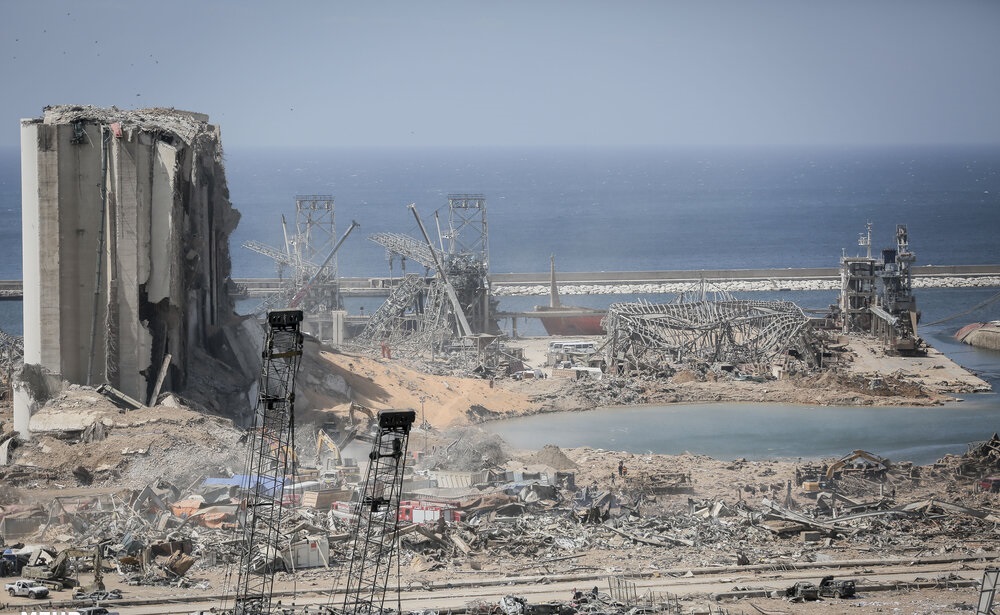
John Geagea (MBA ’21) takes a look at Lebanon’s past, present, and path forward.
It is difficult to put into words how it feels to be Lebanese today. My head keeps coming back to this startling reality: somehow Covid-19 might have become the third most pressing issue that the country now faces. On August 4, an estimated 2,750 tons of ammonium nitrate detonated at the port of Beirut, one of the largest non-nuclear explosions in history. As of this writing, more than 200 people are confirmed dead, more than 6,000 are injured, and there is billions of dollars in damaged property. The explosion came at a time of dire economic and financial crisis, as Lebanon endures the fallout of decades of financial mismanagement. The result: bond defaults, hyperinflation, and poverty rates now estimated to be an unfathomable 50% of the total population. Amidst the heartache and frustration of watching Lebanon brought to its knees, I keep returning to two questions: (1) How did we get here? (2) Where can we find hope?
Lebanon dates back thousands of years to the sea-faring Phoenicians, but today’s story really starts post World War I, with the fall of the Ottoman Empire and the placement of Lebanon under the French mandate. The French mandate ended in 1943, paving a path to independence but with a twist: a uniquely hybrid Western-Arab model, that is based on power-sharing among various religious sects. Notably, by custom, the Speaker of Parliament is Shiite Muslim, the President Maronite Christian, and the Prime Minister Sunni Muslim.
Today, it’s easy to see how an archaic system of sectarian democracy was always doomed to fail. Nothing is simple in the Middle East, especially when it comes to culture and religion. But Lebanon is still fondly remembered for its heyday as a progressive cultural and financial hub. Where did things go wrong? Amidst years of instability, civil war, foreign intervention by regional and superpowers, politicians sought tutelage and support from foreign sources. This also engendered a pervasive culture of “me first” where politicians lined their pockets for personal gains and to buy the allegiance/vote of those who elected them. Corruption and abuse of power have undermined faith in the very institutions that should strengthen our country.
Corruption in Lebanon is everywhere. The electricity sector provides a good example. As a child, I remember spending my summers at my grandparents’ homes. We knew the power would switch off for several hours a day, usually around 2 PM. A minute later, things would flip back on as the back-up diesel generator would kick in. Fast forward 20 years and the situation has not changed. The outages can last up to 20 hours a day for many people, who often do not have the fortune of having a backup generator. Electricity blends all of Lebanon’s problems: divisive sectarian politics, opaque political spending, and “me first” behavior. Providing power is viewed as heavily sectarian. By some estimates, more than 80% of the Hezbollah-controlled southern part of Lebanon do not pay for their electricity. Power theft is widely accepted as common practice. Those who do pay for electricity pay two bills: one to the state electricity company Electricite du Liban (EDL), and one to the backup generator providers. Because of lack of infrastructure, EDL cannot meet base load demand. The solution has been reliance on expensive imports of oil-based power generation. For example, around 2012, the government sought foreign aid to build new power plants while contracting offshore Turkish vessels to provide a stopgap power solution. Since then, the plants have not been built, and the cost of these expensive temporary solutions have been borne by the government. EDL subsidizes the cost of power to the tune of two billions of dollars a year, and after decades this now accounts for roughly one-third of the country’s current debt burden.
Why have these power plants not been built? The providers of generators (coined the Generator Mafia) have little incentive to see their business disappear and actively lobby against them. Politicians insist on their original plan to build three power plants, one in a Shiite area, one in a Sunni region, and one in a Christian area. This approach is opposed by foreign investors who insist on pursuing the lowest-cost options above all else. Finally, these “temporary” contracts were awarded under a dubious bidding process. In every cabinet formation, the Energy Ministry has been highly prized. For the last 10 years, it has been controlled by the Free Patriotic Movement (FPM), a large Christian party whose founder is currently the Lebanese President and whose current leader is the President’s son-in-law. At the January 2020 World Economic Forum, Hadley Gamble of MSNBC moderated a panel with the FPM leader and the Dutch Trade minister as her guests. The interview is quite telling of how a Lebanese minister conducts himself as compared to a counterpart in Europe. When asked how he got to Davos, the Lebanese minister said he chartered a flight. When pressed on how he could afford it based on a monthly salary of around $5,000, the minister said it was paid for by a friend. At this point, the Dutch minister said: “in my country, this would not be allowed.”
The electricity crisis is but one microcosm of the broader systematic failure. This came to a head in October 2019 with the infamous WhatsApp tax that was the proverbial straw that broke the camel’s back. Lebanese citizens of all backgrounds took to the streets in historic fashion to peacefully protest and managed to get the government to resign. The government, led by Saad Al-Hariri (son of former PM Rafik Al-Hariri) submitted its resignation, but the protestors wanted even more change. A new government was formed under PM Hassan Diab, a relatively unknown politician who was nominated by Hezbollah and its allies. He proved ineffective and during his tenure, the crippling economic situation worsened, as Lebanon defaulted on a $1.2 billion Eurobond, the first default in the country’s history. The Lira, long pegged at 1,500 to a dollar, has devalued more than 60%. Strict capital controls limiting people’s access to their own cash in Lebanese bank accounts and the ensuing hyperinflation have effectively eroded the middle class. Any shred of credibility political leaders may have had was eviscerated along with the port. Documents show the explosive materials had sat at the port for six years despite multiple warnings. Hassan Diab’s government has since resigned and remains in a caretaker capacity until new elections.
If the situation I have painted seems grim, that’s because it is. I am left wondering where we can find hope.
We can find hope in a landmark peace agreement.
The recent peace agreement between Israel and the UAE was truly historic. A third Arab state recognizing Israel provides much needed hope for stability in the region. Some suggest that the timing of this agreement has more to do with a common enemy in Iran. Nonetheless, the implications could be positive for Lebanon. Iran sends military weapons to Hezbollah that have allowed it to operate as a state within a state. Increased pressure on Iran may convince Hezbollah to switch its allegiance to the Lebanese State instead of a foreign power. The path for hope to a new country starts with removing the weapons from any entity but the State and taking a neutral stand with respect to any regional issue that may negatively impact the Lebanese citizens and their future.
We can find hope in global leadership.
One of the first people seen on the streets amid the rubble was French President Emmanuel Macron. The images of him embracing citizens in the street went viral. Notably absent were Lebanese leaders, many of whom were chased and harassed if spotted. The international community understands that if Lebanon becomes a failed state, it will create not only regional instability, but it could also lead to a massive migration to the West. The international community, with a stick-and-carrot approach, can help the Lebanese pave a path to saving the nation. The stick may be the threat of sanctions on politicians and the freezing of their personal assets transferred illegally outside the country. The carrot may be a package of financial aid, from either the IMF or donor states, to be released only when necessary reforms are enacted by the government and a newly elected parliament.
We can find hope in the next generation.
There is a real fear of the brain drain resulting from a situation that may need years to resolve. Doctors, lawyers, scientists, and engineers who either were educated in Lebanon or who returned from education abroad may have seen enough to head elsewhere. Many more, however, will stay either due to lack of alternatives or due to steadfast belief. These people are vocal, and they demand better. And the Lebanese diaspora across the world is behind them. The demonstrations that Lebanon has seen since last October give hope that many Lebanese are tired of failed politicians and are looking for real change.
Finally, thanks to all of you who have checked in on any Lebanese friend or colleague during this difficult time. For anyone looking to donate and not sure where to look, here are three good places to start your search: Lebanese Red Cross, Impact Lebanon, and SEAL USA.
 John Geagea (MBA ’21) graduated from the University of Pennsylvania in 2014. Prior to HBS, he worked in energy and consulting in Houston.
John Geagea (MBA ’21) graduated from the University of Pennsylvania in 2014. Prior to HBS, he worked in energy and consulting in Houston.


